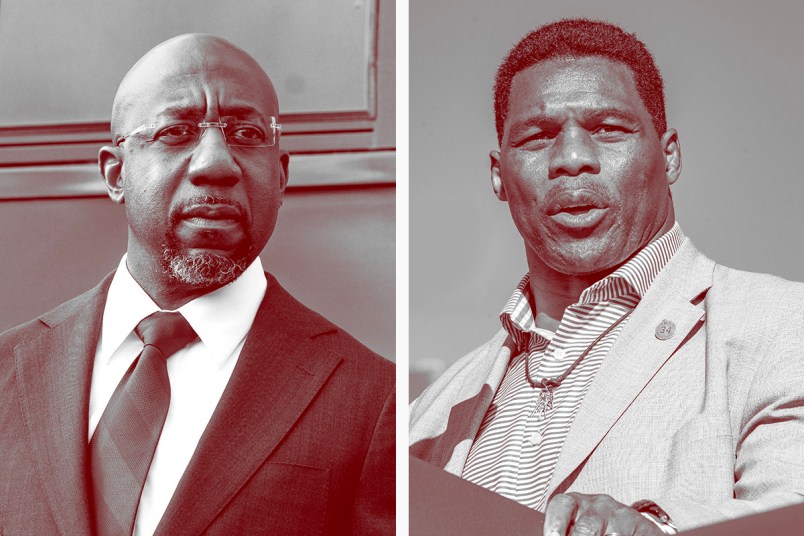Once again, we wait with bated breath for Georgia to decide the composition of a narrowly split Senate with its wintertime runoff election.
But this time, conditions are different. The contest will not decide the Senate majority, which Democrats have already secured.
It’s happening earlier in the year than it did in 2020; the final runoff race last time was called for Jon Ossoff while the MAGA mob was attacking the Capitol on Jan. 6. Georgia Republicans cut the runoff calendar in half in 2021 after the double-header Democratic Senate wins, part of a bundle of voter restrictions they passed in response.
And this time, it’ll be easier to glean overarching lessons. It’ll be another data point in Georgia’s political evolution, another oddly timed contest with which to gauge enthusiasm and voting patterns in non-presidential contests.
Here’s what we’ll be watching on Tuesday, as the results unfold:
How blue is Georgia?
Democrats first dared to hope when Stacey Abrams finished two points away from beating then-Secretary of State Brian Kemp (R) in 2018. Two years later, President Joe Biden scooped up the state, and Ossoff and Raphael Warnock both triumphed in their runoff contests.
Georgia has been trending blue for a while, and a Warnock repeat on Tuesday would solidify that reality.
Republicans are by no means out of the game: Kemp beat Abrams handily this time around, and Republicans swept all the statewide races (except the Senate) last month.
But it wasn’t that long ago that Georgia was a decidedly red state. Democrats’ fortunes have changed fast there, thanks to rapid demographic changes and seemingly enduring success with a newer suburban coalition.
A decisive Warnock win could provide Democrats with an inkling as to where the state is going. Many will hope that Georgia right now is like 2010-era Virginia, two years after the 2008 realignment election when the state gave its electoral votes to Barack Obama after 44 years of choosing Republicans. Virginia has only voted for Democratic presidents and senators since.
Is Georgia the new Nevada?
Much of Democrats’ success in the Peach State has been attributed to the construction of an organizational machine there, a robust turnout and mobilization infrastructure.
If it lifts Warnock to victory again, we may well hear some Harry Reid comparisons bandied about.
Conventional wisdom has held that oddly timed elections help Republicans, whose constituents historically have shown up better than Democrats’ to low-turnout contests. That chestnut was wrong in 2020, and should be tossed entirely if it’s wrong again.
Georgia Republicans also passed a slew of measures to make it harder to vote after their big losses in 2020. Some of those built-in obstacles were evident in the long lines voters had to suffer through, a direct result of the curtailed runoff calendar and very few early voting days. Warnock himself waited in line for an hour in Fulton County, one of the biggest population centers that includes Atlanta.
If Democratic voters, especially Black Democratic voters, overcome the obstacles passed into law to make it harder for them to vote, that does not mean the voter suppression doesn’t exist. It does, however, send a big signal as to the enthusiasm of the voters willing to endure it — which may stem directly from that new turnout machine.
Can fame trump bad candidate quality?
Mehmet Oz gives us one data point in the “no” category on this one, but Herschel Walker’s fame is more specific to Georgia. The Heisman Trophy-winning running back played at the University of Georgia, and was inducted into the College Football Hall of Fame. That was enough for Donald Trump, who in turn hoped it’d be enough for a state that takes its football, and its Dawgs, seriously.
While celebrity has always been part of American politics, it’s become a more pressing question thanks to Trump’s penchant for encouraging and endorsing people who have been on TV.
Walker is obviously a very flawed candidate. His speeches are often odd and hard to follow; he has to bat away a new scandal every other week; he has a history checkered with accusations of violence and fairly extreme mental illness; even his residency in the state is in doubt. In a weekend interview, he appeared to mistake which chamber he was running for, and to think that the runoff would decide majority control. In the final stretch of the campaign, he has been holding notably few events and public appearances.
If he wins anyway, that’s a resounding statement that fame can help overcome an awful lot of baggage.
Who’s more enthused?
Turnout has been high throughout the early voting period. As the votes are tallied, we’ll see whose voters are more enthusiastic for their candidate.
Walker lost his best argument for those Republicans cold on him but invested in congressional dominance when the networks called Nevada for Sen. Catherine Cortez-Masto (D-NV), clinching Democratic control. With the Senate decided, pragmatic-but-unenthused voters have less of a reason to drag themselves to the polls.
Now we’ll see whose voters are juiced up enough to come out and vote in a much lower-stakes election, when their affection towards the specific candidates will likely factor in much more.







Am I Frist??!!
We need a good win in GA – for Warnock. Y’all are going to have to pull the weight here at TPM. I will be spending the next 2 hours getting my right knee replaced, and thereafter being pretty drugged.
Go, HIVE!
YIKES!
Good thoughts headed your way! Not that you’ll kneed them.
ETA. Hopefully the same can be said of Warnock.
It’s so worth it. My best friend suffered for years and finally got one of his replaced and it was amazing. Rehab was remarkably quick. Good luck (you won’t need it). Warnock will take care of the dope.
As Ray Charles often observed, “I’ve got Georgia on my mind.”